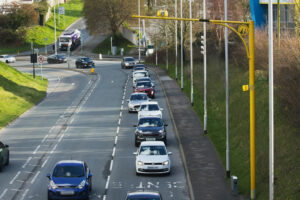Government is being urged to deliver greater clarity over what it wants to achieve with local bus services in the UK and also how it plans to measure the success of this.
Improving local bus services in England outside London, a new report released by the National Audit Office (NAO) has found that, despite the Department for Transport’s long stated aim to increase bus use, passenger numbers have fallen.
Between 2010-11 and 2018-19 the number of bus journeys fell in 65 of 88 English local transport authorities outside London and by 10% overall. The COVID-19 pandemic led to a drastic reduction in bus travel across the country and created uncertainties about future travel habits. However, bus travel will likely remain the primary and essential mode of transport for many, especially the most disadvantaged, said the report.
The report goes on to say that while the Department for Transport (DfT) is not accountable for delivering bus services, it does have national policy responsibility.
“It is now preparing to commit significant new funding to bus services and to lead a national strategy for improvement against a background of considerable uncertainty. The Department collects data on buses and can show it has funded valuable improvements, but to date it has not sought to demonstrate how its actions have contributed to supporting optimal value for money across the bus system. If it is to work with and through others at central and local level, make informed choices about funding, and be able to adjust its plans to ensure it meets its objectives, it will need greater clarity on what it wants to achieve and how it will know when it has done so.”
But the report also said: “During the COVID-19 pandemic, the Department has come together with local authorities and operators, intervening rapidly to target the weakest areas and keep buses running, which offers learning for the future.”
The Department considers that good quality bus services support local economies, help ease congestion, reduce greenhouse gas emissions and better connect communities, said the report.
In September 2019, it announced that it would develop the first National Bus Strategy for England and in February 2020 committed £5 billion over the next five years to promote buses, walking and cycling. Progress with the strategy has been delayed due to COVID-19. However, the Department told the NAO that during the pandemic it had been able to work with local authorities and operators to understand areas of critical need and target support.
In 2019 central and local government subsidies and support made up around 24% of bus operators’ revenue income from bus services. However, increasing congestion means bus operators need to put on more buses to maintain frequency, which, when combined with falls in paying passengers, puts pressure on operator profit. The Department pays a subsidy to operators to keep services running and fares down, but between 2010-11 and 2018-19, estimated operator revenue fell by 11% and bus fares increased by 18% on average.
Between 2010-11 and 2018-19, 72 local authorities reduced spending on those bus services which operators would otherwise see as not commercially viable (supported services) and which often serve rural and disadvantaged bus passengers. Of these, 42 reduced funding by over 50%. The Department does not know how passengers have been affected by the loss of supported bus services, said the report.
“The Department does not know if it is getting the best value from its short-term capital funding to local authorities and bus operators. Some funds are bus-specific, for example to support investment in zero emission vehicles or bus infrastructure. The Department’s evaluations show that it has funded schemes that have delivered valuable improvements, although some schemes go wider than bus improvements. However, local authorities told the NAO that the resources needed to bid and account for this funding can be too great,” said the report.
Gareth Davies, Head of the NAO said: “Despite the Department for Transport’s long-stated aim to increase bus use, passenger numbers have fallen since 2010. The Department has funded some valuable local enhancements to bus services but these do not constitute systemic improvement. To meet the needs of local people, especially those in rural and disadvantaged communities, the Department’s future bus strategy should match the funding provided to its objectives, and better enable local authorities and operators to work together.”
























